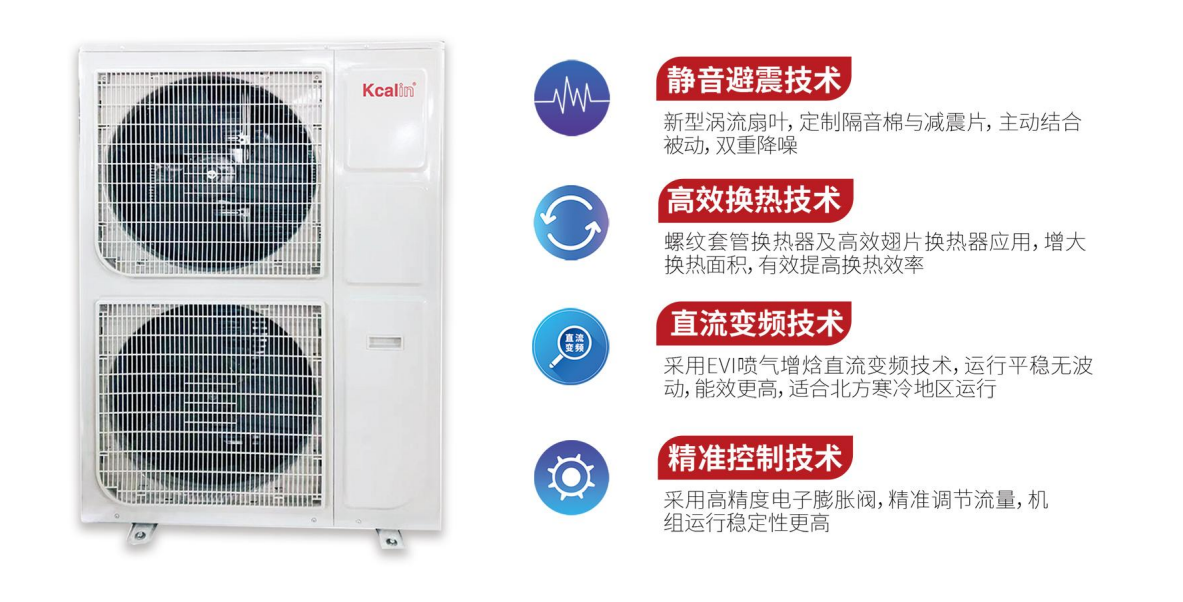In the pursuit of efficient and environmentally friendly heating and cooling solutions, heat pump technology is increasingly receiving attention. As two mainstream heat pump technologies, water source heat pumps and air source heat pumps each have their own advantages and applicable scenarios. So, which type of heat pump is better?
Characteristics of Water Source Heat Pump
Water source heat pumps utilize the thermal energy in water bodies such as groundwater, lakes, rivers, or seawater for heating and cooling. Its working principle is to transfer heat through the temperature changes of the water body.
Efficient and energy-saving: The energy efficiency ratio (COP) of water source heat pumps is usually high because the temperature of the water body is relatively stable and not greatly affected by temperature. This enables water source heat pumps to maintain efficient operation even in extremely cold weather conditions, saving energy.
Strong environmental adaptability: Due to the relatively stable temperature of the water body, the working efficiency of the water source heat pump is not affected by the external temperature. In cold winter or hot summer, water source heat pumps can provide stable heating and cooling.
High initial investment: The water source heat pump system requires water source development and pipeline laying, which makes its initial investment relatively high. In addition, the requirements for water resources are high and the installation conditions are limited, making it unsuitable for some geographical environments.
Complex maintenance: The system of a water source heat pump is quite complex, involving the management and maintenance of the water source. Regular inspections and maintenance are required to ensure the stable operation of the system. This increases the maintenance cost in the later stage.

Characteristics of air source heat pump
Air source heat pumps use the heat energy in the air for heating and cooling, and their working principle is to transfer the heat in the air to the indoor environment through a compressor.
Easy installation: Air source heat pumps do not rely on specific water sources, only need to install the main unit outdoors. The installation process is relatively simple and has a wide range of applications. Especially suitable for areas without stable water sources.
Energy saving and environmental protection: The energy efficiency ratio (COP) of air source heat pumps is usually between 3.0 and 4.0, which means that for every 1 kWh of electricity consumed, 3 to 4 times more heat energy can be generated. During its operation, it hardly emits harmful gases such as carbon dioxide, which meets environmental protection requirements.
Affected by temperature: The efficiency of air source heat pumps is greatly affected by external temperature. In the cold winter, the energy efficiency of air source heat pumps may decrease, and auxiliary heating equipment may be needed to ensure heating effectiveness.
Lower initial cost: Compared to water source heat pumps, air source heat pumps have lower initial investment and do not require water source development or complex pipeline laying, making them suitable for households and small commercial spaces with limited budgets.
How to choose a suitable heat pump?
Geographical environment: If the location has stable and sufficient water resources and allows for water source development, water source heat pumps are an efficient and energy-saving option. In areas without stable water sources, air source heat pumps are more suitable.
Initial investment: If the budget is sufficient and willing to invest a higher amount of funds in the initial stage, a water source heat pump can be chosen, which has lower long-term operating costs. If the budget is limited, the initial investment of air source heat pumps is lower and more economical and practical.
Maintenance capability: For users who have the ability to perform complex system maintenance, water source heat pumps can provide more stable and efficient heating and cooling effects. For users with limited maintenance capabilities, air source heat pump systems are relatively simple, have lower maintenance costs, and are more convenient.
Environmental temperature: In areas with significant temperature changes, the performance of water source heat pumps is more stable and can provide reliable heating and cooling effects. In regions with relatively mild climates, air source heat pumps have higher operating efficiency and can meet daily needs.
Water source heat pumps and air source heat pumps have their own advantages and disadvantages, and the selection should be based on specific geographical environment, budget, maintenance capacity, and climate conditions. Water source heat pumps are highly efficient and energy-saving, but the initial investment and maintenance costs are relatively high; Air source heat pumps are easy to install and have low initial costs, but their efficiency is greatly affected by temperature. By weighing these factors, you can choose a heat pump system that suits your needs to achieve efficient and environmentally friendly heating and cooling.







Comment